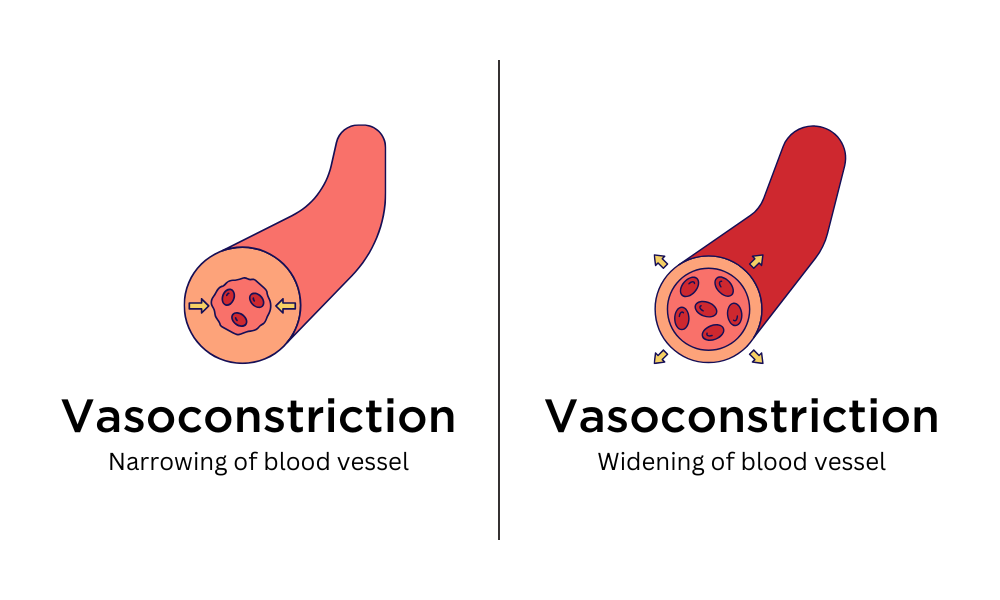Blood pressure is a crucial indicator of cardiovascular health and maintaining it within a normal range is essential for overall well-being. High blood pressure (hypertension) and low blood pressure (hypotension) can lead to serious health complications. Various factors influence blood pressure, including diet, gut health, and the function of epithelial cells in blood vessels. In this article, we will explore the causes of blood pressure fluctuations and natural ways to regulate it effectively.
The Role of Epithelial Cell Health in Vasodilation and Vasoconstriction
Epithelial cells line the blood vessels and play a significant role in regulating blood pressure through vasodilation (widening of blood vessels) and vasoconstriction (narrowing of blood vessels). When these cells are healthy, they help release nitric oxide, a compound essential for relaxing blood vessels and maintaining proper blood flow. However, inflammation, oxidative stress, and poor lifestyle choices can impair epithelial cell function, leading to increased blood pressure.

How to Support Epithelial Cell Health:
- Consume antioxidant-rich foods such as berries, green leafy vegetables, and nuts.
- Avoid processed foods high in trans fats and refined sugars.
- Engage in regular physical activity to improve vascular function.
- Manage stress through mindfulness, meditation, or yoga.
- Product recommendations: Vein and Artery Support; Cell Health Protector; Cardio Vitality Enhancer.
Dietary Impact on Blood Pressure
Diet is a primary factor influencing blood pressure levels. While excessive processed sodium intake can contribute to blood pressure imbalances, research has shown that good quality salt intake, such as unrefined sea salt or Himalayan salt, can support hydration and reduce water retention. Proper sodium balance helps maintain fluid equilibrium in the body, preventing unnecessary stress on blood vessels.
Nutritional Recommendations:
- Consume unrefined sea salt in moderation to support hydration and electrolyte balance.
- Increase potassium-rich foods like bananas, sweet potatoes, and spinach.
- Stay well-hydrated to support proper blood viscosity and circulation.
- Incorporate omega-3 fatty acids from fish, flaxseeds, and walnuts to improve vascular health.
How Proper Salt Intake and Hydration Reduce Water Retention and Regulate Blood Pressure
Contrary to outdated beliefs, good quality salt intake can help regulate blood pressure by ensuring proper fluid balance. When paired with adequate daily water intake, natural salts assist the kidneys in efficiently processing and eliminating excess fluids. This prevents water retention and supports optimal circulation, which can alleviate pressure on the cardiovascular system. Improper salt intake can lead to fluid retention, prompting doctors to prescribe water pills, which may strain the kidneys and potentially lead to kidney failure.
How to Balance Salt and Water Intake:
- Drink sufficient water daily, based on individual hydration needs: Water Intake(liters)= (weight ÷ 8 ) x 0.25
- Use high-quality salt like Himalayan -/Celtic Salt to maintain electrolyte balance and prevent dehydration.
The Impact of Acidic Foods on Blood Thickness and Digestion
Eating acidic foods can influence blood viscosity, digestion, and overall circulatory function. High consumption of acidic foods like processed meats, refined sugars, and excessive caffeine can lead to increased fibrin (hair-like structures that help in blood clotting) production and thrombocyte (platelet) activity. This can contribute to blood clot formation and hinder proper circulation, leading to an increased risk of hypertension and cardiovascular disease.
How to Maintain a Balanced pH:
- Incorporate an 80% Alkaline Dietary lifestyle.
- Drink herbal teas and alkaline water to maintain a balanced pH level in the body.
- Drinking an additional 30ml Raw Apple Cider Vinegar mixed with water can be a good way to increase body alkalinity.
Magnesium and Its Role in Calcium Absorption
Magnesium plays a crucial role in regulating blood pressure by influencing calcium absorption. Calcium is vital for muscle contraction, including the contraction of blood vessels. However, an imbalance—too much calcium and too little magnesium—can lead to excessive constriction of blood vessels, raising blood pressure.
Other Ways Magnesium Influences Blood Pressure:
- Heart Rhythm Regulation: Magnesium helps maintain a steady heart rhythm by supporting electrical signals in the heart. Deficiency can lead to arrhythmias (irregular heartbeats), which can increase cardiovascular stress and affect blood pressure regulation.
- Reducing Inflammation: Chronic inflammation is a known contributor to hypertension. Magnesium has anti-inflammatory properties that help lower inflammation levels, reducing strain on blood vessels and promoting healthier circulation.
- Vasodilation Support: Magnesium helps relax blood vessels, reducing resistance in the arteries and lowering blood pressure.
Ways to Increase Magnesium Intake:
- Eat magnesium-rich foods such as dark chocolate, avocados, and nuts.
- Reduce excessive calcium supplementation unless advised by a healthcare provider.
- Engage in stress-reducing activities, as chronic stress depletes magnesium levels.
- Product recommendation: Magnesium Complex
The Link Between Gut Health and Blood Pressure
The gut microbiome significantly impacts blood pressure regulation. Poor gut health can lead to systemic inflammation, which affects vascular function and increases blood pressure. Dysbiosis (imbalance of gut bacteria) has been linked to higher blood pressure and increased cardiovascular risk.
Strategies for Gut Health Improvement:
- Consume probiotic-rich foods like yogurt, kefir, and fermented vegetables.
- Cut out sugars, starches and preservatives.
- Avoid excessive antibiotic use, which can disrupt gut flora balance.
- Manage stress, as high stress negatively affects gut microbiota.
- Product recommendations: Gut Health; Bioworx Umkhonto; Bioworx Intesticol
Conclusion
Maintaining a healthy blood pressure level requires a multifaceted approach that includes proper diet, gut health, balanced mineral intake, and vascular function. By making conscious lifestyle changes such as reducing processed foods, supporting gut microbiota, ensuring adequate magnesium levels, and protecting epithelial cell health, you can promote optimal cardiovascular function and overall well-being. Prioritizing these factors will help you achieve long-term blood pressure balance and a healthier life.

